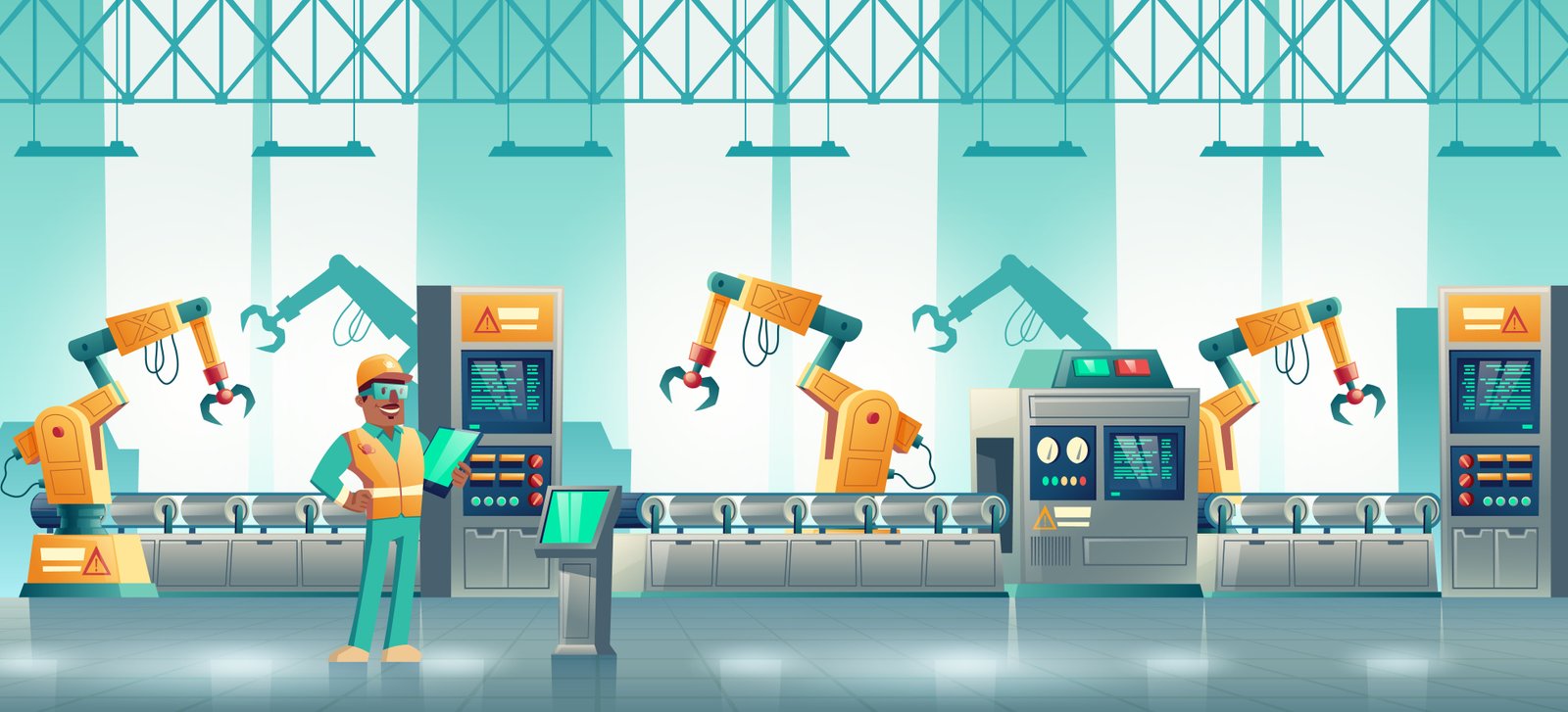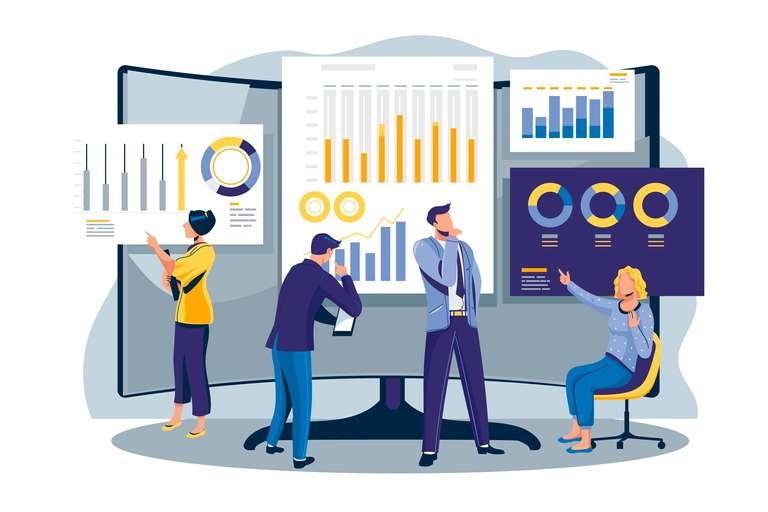Top Seven Applications of AI in Manufacturing

The Role of AI in Manufacturing
What if factories were run by intelligent machines that could think, learn, and make decisions on their own? The manufacturing sector has entered a new era where AI and machine learning models drive efficiency, productivity, and profitability.
Machines have become active partners in the production process, helping analyze data, identify patterns, and adjust performance in real-time. AI is transforming every aspect of the manufacturing industry, from assembly lines to supply chains. For example, AI can run production lines without human intervention and learn from experience, improving over time. They can assemble complex products and predict/prevent equipment failures by analyzing sensor data, reducing downtime, repair costs, and improving worker safety.
Applications of AI in Manufacturing
The utilization of artificial intelligence in manufacturing market has revolutionized operations and improved productivity largely due to its ability to optimize operations. A wide variety of AI applications are available in manufacturing and can be categorized as follows:
Predictive Maintenance
AI-based predictive maintenance is a technology that helps manufacturers keep their equipment running smoothly by using sensors and machine logs to predict when equipment might break down.
By analyzing this data, AI algorithms can anticipate potential problems and schedule maintenance to prevent unexpected downtime. This approach also allows manufacturers to reduce the frequency of unnecessary preventive maintenance and save operating costs while enabling factories to operate more efficiently and double their production capacity.
Automated Quality Control
Computer vision is a technology that uses high-resolution cameras to observe every step of production, and with the help of AI, it can identify flaws that may be missed by human eyes. This helps manufacturers detect problems quickly and fix them before the products are shipped, resulting in fewer product recalls and waste.
Additionally, AI-based quality assurance systems use machine vision and deep learning algorithms to inspect products and identify defects that may be missed by human inspectors. This helps improve product quality, reduce waste, and increase efficiency while enhancing workplace safety by detecting abnormalities, such as poisonous gas emissions, in real time.
Inventory Management
Manufacturers must be adaptable to shifts in the market, demand, customer expectations, and manufacturing techniques to manage orders effectively. Manufacturing robots or AI-based technologies can help manufacturers manage their orders more efficiently in several ways.
For instance, they can handle a variety of order types from various sales channels, issue purchase requests automatically, and improve the transparency of order and inventory management using inventory tracking sensors. This technology aids in streamlining processes and improving the effectiveness of the order management procedure.
Autonomous Robots
Autonomous robots or robotic process automation equipped with AI can perform a variety of tasks in manufacturing companies, such as assembly, material handling, and quality assurance. This technology helps manufacturers improve efficiency, reduce costs, and improve worker safety.
Additionally, industrial robots automate monotonous tasks, eliminate or reduce human error, and free up the time of human workers for more profitable parts of the business. By using machine vision, these robots can move precisely in chaotic settings.
Supply Chain Optimization
AI tools can help improve supply chain management by analyzing data from various sources, including suppliers, customers, and logistics providers. By analyzing this data, manufacturing companies can optimize inventory levels, reduce lead times, and improve order fulfillment.
Additionally, AI can help manufacturers identify potential supply chain disruptions and take proactive measures to mitigate them. With AI, a manufacturing firm becomes a smart factory. It can more effectively manage every aspect of its supply chains, from stocktaking to capacity forecasts.
This technology enables businesses to establish a real-time and predictive model for assessing and monitoring suppliers, so they can quickly respond to any disruptions in the supply chain.
Safety Alerts
AI-powered safety systems are used in manufacturing sectors to monitor workplace conditions and detect potential safety hazards. They use sensors, machine vision, and deep learning algorithms to analyze data and issue safety alerts to workers and supervisors.
These alerts can help prevent accidents, injuries, and fatalities in the workplace by identifying potential faults or failures in equipment and machinery, detecting workers engaging in unsafe behavior, and alerting them to potential safety hazards in real-time.
Hands-Free Control
AI-powered hands-free control systems in manufacturing plants enable human workers to control machinery and equipment using voice commands or gestures without needing to physically touch them. This is particularly useful in hazardous environments where physical contact must be minimized.
By using natural language processing and computer vision, AI algorithms can interpret voice commands or gestures and perform actions. This improves safety, reduces contamination risks, and allows workers to perform delicate tasks without compromising on precision.
Companies Leveraging AI to Optimize their Manufacturing Process
Many prominent companies such as Boeing, Canon, BMW, General Motors, and Bombardier are utilizing AI to improve the efficiency and productivity of their manufacturing operations and produce high-quality products at a faster rate while also reducing costs and improving worker safety.
Boeing
Boeing is leveraging AI in manufacturing to simplify complex tasks and optimize processes. It's using machine learning algorithms and computer vision-based techniques to identify patterns in data and make recommendations for designs, supply chain efficiency, and inventory optimization. Boeing uses predictive analytics to simulate design to build processes, improving customer-driven design changes.
Canon
Canon, a global leader in automation and workforce management, leverages machine learning algorithms and AI to transform workflows in innovative ways, driving business process transformation.
Canon applies AI and machine learning algorithms to automate core processes, such as invoice processing, claims processing, eDiscovery, and digital mail. This helps the company achieve significant, measurable performance improvements, resulting in an improved customer experience and greater efficiency.
To maximize the opportunities in artificial intelligence and machine learning, Canon suggests three best practices: capture data beyond "scan and store," analyze your data for process improvement opportunities, and involve a managed services provider as a consulting and/or outsourcing partner in assessing and implementing these types of ai solutions.
BMW
BMW has been using artificial intelligence in manufacturing of its cars since 2018. One of the main applications of AI systems is automated image recognition, which evaluates images of car components in real time and compares them to hundreds of other images. This helps to determine whether all parts have been mounted in the right place and whether any deviations from the standard have occurred.
General Motors
General Motors has invested in Israeli startup UVeye, which uses AI systems and sensors to identify damaged parts or maintenance issues in vehicles. GM will sell UVeye's technology to its dealer network to update its vehicle inspection systems.
Additionally, the two businesses will work together on vehicle inspection technology initiatives covering fleet management, used car auctions, and automotive dealership sales. UVeye's system uses AI, machine learning, and high-definition cameras to quickly and accurately check vehicles for defects, missing parts, and other safety-related issues.
Bombardier
Bombardier uses AI to enhance its parts availability process through a new research project aimed at monitoring customer parts usage and tendencies to ensure fleet-wide parts are always available.
In collaboration with Scale AI, the project will build more robust AI-generated algorithms to predict parts demand and availability, enabling Bombardier to analyze and predict customer purchasing tendencies far beyond what a human can while also uncovering previously unknown purchasing behaviors.
The manufacturing company is also collaborating on a research project called DEEL to mature AI technologies and establish their dependability and certifiability.
Conclusion
Manufacturers need to adopt a holistic approach to drive growth and remain competitive in today's market. Top management must take the initiative to embrace AI solutions and make informed decisions aligning with the business objectives. This includes hiring the right talent and investing in technology that supports digital transformation.
Manufacturers should also be aware of the technical lock-in period, where there may be challenges in integrating AI solutions into existing systems. However, this period should not deter them from pursuing AI solutions, as the benefits, in the long run, will outweigh the initial challenges.
It is also essential for manufacturers to have a deep understanding of their business processes and how they can be optimized using AI solutions.
While AI solutions may take time to implement, their benefits are significant. With the right approach and mindset, manufacturers can leverage AI solutions to improve efficiency, drive growth, and remain competitive in the market.
FAQs
How AI is being used in manufacturing?
AI is used in manufacturing to enhance productivity and efficiency, improve quality control, and lower costs.
How can AI affect manufacturing?
AI can enable hands-free control, increase worker safety, reduce labor costs, lower energy consumption, improve supply chain management, lower operational costs, predict equipment failure, analyze equipment performance, and keep up with future demand.
Several manufacturing companies are also launching AI robots and AI software to support the production line and reduce the production costs of their manufacturing systems.
What is the future of AI in manufacturing?
The future of AI in manufacturing is promising, with more advancements in machine learning, computer vision, and robotics. This technology will further optimize production processes, reduce waste, improve quality, and enhance supply chain management and worker safety.



